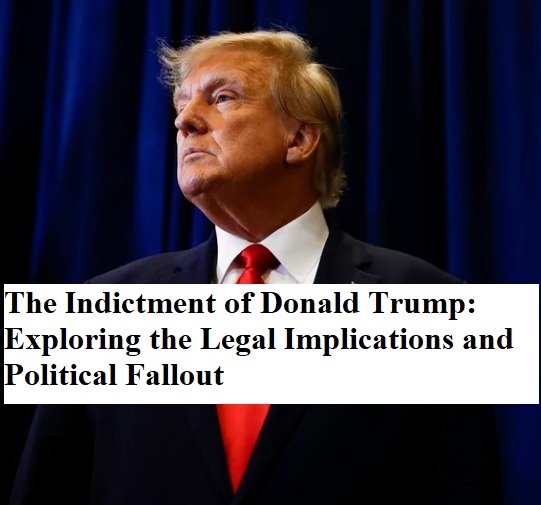The recent news that former President Donald Trump has been indicted by a Manhattan grand jury has sent shockwaves throughout the country. This marks the first time in U.S. history that a former president has been criminally indicted, and the charges are expected to be released in the coming days.
The charges stem from hush-money payments made by Trump’s former personal attorney, Michael Cohen, to adult film actress Stormy Daniels in 2016. Daniels had claimed that she had an affair with Trump, which he has denied. Cohen pleaded guilty to several federal charges, including making illegal campaign contributions, and outlined the scheme that involved paying Daniels $130,000 to keep her allegations quiet.
The grand jury’s indictment of Trump is expected to be unsealed soon, and he has been ordered to surrender to the Manhattan District Attorney’s Office for arraignment on a Supreme Court indictment, which remains under seal. Trump’s spokesperson has called the indictment “political persecution and election interference.”

The legal implications of Trump’s indictment are significant. If he is found guilty, he could face a prison sentence or hefty fines. Moreover, this indictment could have long-lasting consequences for Trump’s political future, as it would make it difficult for him to run for office again.
The political fallout of this indictment is also significant. Trump has a loyal base of supporters, many of whom have already shown their support for him in the face of these charges. Some have even called for large protests to support him. However, this indictment could also further damage Trump’s reputation and make it difficult for him to regain the support of the broader Republican Party.
The investigation that led to Trump’s indictment began in 2018 under then-District Attorney Cyrus Vance Jr. and quickly grew to become a broad probe of Trump’s business practices. In 2019, Vance subpoenaed Trump for eight years of tax returns, which Trump fought in the Supreme Court. The high court ultimately sided with Vance, allowing him to obtain the records in early 2021.
By the end of that year, Vance’s team was preparing an indictment of Trump built around possible misrepresentations to banks and tax authorities over many years about property valuations. But the new DA, Alvin Bragg Jr., decided against seeking an indictment for a wide-ranging fraud scheme, and the two lead prosecutors on the case quit in protest.
The fallout from Trump’s indictment is likely to be significant, and it remains to be seen how it will affect his political future. Regardless, this marks a historic moment in U.S. politics and underscores the importance of holding even the most powerful accountable for their actions.
The indictment of former President Donald Trump by a Manhattan grand jury marks a historic moment in American politics and legal history. Trump is the first former president to be criminally indicted in the United States, and the charges are related to hush-money payments made to adult film actress Stormy Daniels in 2016.
The payments were made by Trump’s former personal attorney, Michael Cohen, in exchange for Daniels not going public with allegations that she had an affair with Trump. Cohen pleaded guilty in 2018 to numerous federal charges, including making illegal campaign contributions in the form of buying women’s silence about their alleged relationships with Trump.
The investigation into the hush-money payments began under then-District Attorney Cyrus Vance Jr. in 2018 and quickly grew to become a broad probe of Trump’s business practices. In 2019, Vance subpoenaed Trump for eight years of tax returns, which Trump fought in the Supreme Court. However, the high court ultimately sided with Vance, allowing him to obtain the records in early 2021.
By the end of that year, Vance’s team was preparing an indictment of Trump built around possible misrepresentations to banks and tax authorities over many years about property valuations. But the new District Attorney, Alvin Bragg Jr., who was sworn in in 2022, decided against seeking an indictment for a wide-ranging fraud scheme.
Despite this decision, the grand jury continued its investigation into the hush-money payments and ultimately handed down an indictment against Trump. The charges remain under seal but are expected to be released in the coming days.
The indictment has already caused significant political fallout, with Trump issuing an angry response and accusing the prosecutors of engaging in political persecution and election interference. It remains to be seen how the legal case will unfold and what impact it will have on Trump’s future and the broader political landscape.